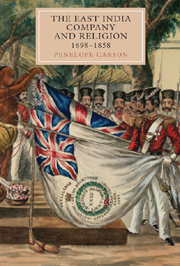Book contents
- Frontmatter
- Contents
- Acknowledgements
- Note on Hinduism
- Abbreviations
- Map of India
- Introduction
- 1 A Christian Company?
- 2 The East India Company, Britain and India 1770–1790
- 3 The 1790s: A Time of Crisis
- 4 The Pillar of Fire Moves Forward: The Advent of British Missionaries 1793–1806
- 5 The Wisdom of the Serpent and the Innocence of the Dove: The Vellore Mutiny and the Pamphlet War 1806–1808
- 6 Troubled Years 1807–1812
- 7 Battle Lines Drawn: Missions, Dissent and the Establishment
- 8 The 1813 Renewal of the Company's Charter: The Religious Public Takes on the Company
- 9 A Turbulent Frontier: The Company and Religion 1814–1828
- 10 A New Dawn? The Era of Lord William Bentinck 1828–1835
- 11 Between Scylla and Charibdis 1836–1858
- Conclusion and Epilogue: Strangers in the Land
- Appendix 1 Presidents of the Board of Control
- Appendix 2 Governors-General and Governors of Madras and Bombay
- Appendix 3 Aide Memoire to Names
- Appendix 4 ‘The Pious Clause’
- Bibliography
- Index
- WORLDS OF THE EAST INDIA COMPANY
9 - A Turbulent Frontier: The Company and Religion 1814–1828
Published online by Cambridge University Press: 05 February 2013
- Frontmatter
- Contents
- Acknowledgements
- Note on Hinduism
- Abbreviations
- Map of India
- Introduction
- 1 A Christian Company?
- 2 The East India Company, Britain and India 1770–1790
- 3 The 1790s: A Time of Crisis
- 4 The Pillar of Fire Moves Forward: The Advent of British Missionaries 1793–1806
- 5 The Wisdom of the Serpent and the Innocence of the Dove: The Vellore Mutiny and the Pamphlet War 1806–1808
- 6 Troubled Years 1807–1812
- 7 Battle Lines Drawn: Missions, Dissent and the Establishment
- 8 The 1813 Renewal of the Company's Charter: The Religious Public Takes on the Company
- 9 A Turbulent Frontier: The Company and Religion 1814–1828
- 10 A New Dawn? The Era of Lord William Bentinck 1828–1835
- 11 Between Scylla and Charibdis 1836–1858
- Conclusion and Epilogue: Strangers in the Land
- Appendix 1 Presidents of the Board of Control
- Appendix 2 Governors-General and Governors of Madras and Bombay
- Appendix 3 Aide Memoire to Names
- Appendix 4 ‘The Pious Clause’
- Bibliography
- Index
- WORLDS OF THE EAST INDIA COMPANY
Summary
The English government in this country should never, directly or indirectly interfere in propagating the Christian religion.
(John Malcolm)THE COMPANY's despatch providing for Church of Scotland ministers as stipulated in the new charter made much of the Company's magnanimity, maintaining somewhat disingenuously that this demonstrated ‘our desire to encourage by every prudent means in our power, the extension of the principles of the Christian Religion in India’. Its attitude towards granting licences to missionaries had not, however, changed. The Court continued to have concerns that missionary activity conducted by Evangelicals was not prudent. Both the Chairman of the Company, Robert Thornton, and Nicholas Vansittart, the Evangelical Chancellor of the Exchequer, advised the CMS to defer its applications until the new charter came into effect in 1814. In November 1813, when both the CMS and BMS decided to apply for licences, they were refused. The Court objected to the wording of the BMS application which did not specify that Eustace, Carey's nephew, was to go out as a missionary. Fuller perceptively thought the Directors were ‘galled with the rope wherewith the petitions and Government have tied their hands, and do not like to grant a favour before they are obliged to it, and yet do not know what to object’. The BMS and CMS then appealed to the Board, which forced the Court to grant the licences. However, the Board altered the Court's draft despatch granting these licences in an unexpected way. The draft had used the phrase, ‘as missionaries’.
- Type
- Chapter
- Information
- The East India Company and Religion, 1698-1858 , pp. 151 - 182Publisher: Boydell & BrewerPrint publication year: 2012



